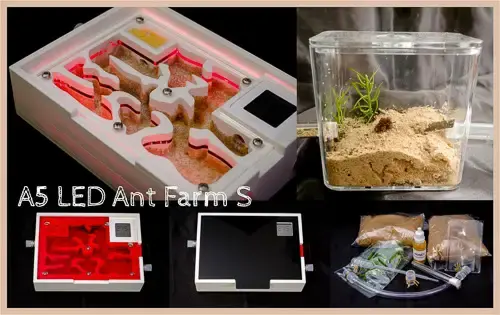Free UK Delivery on orders over £99
Ant Farm Kits with Ants
Our range of ant farm kits with ants includes everything necessary to start and dive into the ants' world. Every ant farm is sold with a queen ant and workers of Lasius Niger (black garden ants) or Messor barbarus (Black Harvester Ant Colony), one of the easiest ant species to raise. These ant farms provide an ecological habitat for observing and learning about ant behaviour.
Each ant farm comes with a clear viewing screen for easy observation of ant activities along with red filter and black cover. Whether you're looking to buy an ant farm for educational purposes or as a fascinating hobby, our collection offers a variety of options to suit your needs.
What Are The Easiest Live Queen Ants and Ant Colonies For a Beginner Ant Keeper?
Beginner-friendly species are Lasius Niger - Black Garden Ants, Lasius flavus - Yellow Meadow Ants, Myrmica rubra - Red Fire Ants and Messor barbarus - common black harvester ants. Lasius species are native to the UK and are particularly well-suited for beginners. These species are ideal for those starting with their first ant farm.
Ant Keeping Guide - Live Queen Ants Care
Wondering how to look after a Lasius Niger (Black Ant), Lasius flavus (yellow meadow ant), Myrmica rubra (red ants UK) or Messor barbarus (Harvester Ants) in your ant farm? Find everything you need to know about common ants for beginners and even the most expensive ant species on the planet on our Blog page - the ultimate resource for ant enthusiasts!
Visit My Living Ant World Blog for comprehensive care guides and tips on maintaining your ant farm.
Essential Ant Farm Accessories
To enhance your ant-keeping experience, consider these accessories for your ant farm:
-
Test tubes: Used for housing queen ants and small colonies.
-
Nesting box: Provides a dark, humid environment for the queen and her brood.
-
Foraging box or outworld: Allows ants to search for food, mimicking their natural behaviour.
-
Cotton wool: Used to plug test tubes and control humidity.
-
Escape prevention PTFE (Fluon): Helps prevent escapes when applied around the ant farm's edges.
-
Plastic transparent tubing: Connects different parts of the ant farm setup.
-
Sand habitat: Creates a natural substrate for certain ant species.
-
Ant farm soil (Ant substrate): Specially formulated substrate for optimal ant tunnelling.
These accessories can help create an escape-proof and comfortable environment for your ants.
Caring for Your Ant Farm
To ensure the health and longevity of your ant colony:
-
Maintain proper humidity using a water dispenser or by misting the ant farm soil regularly.
-
Provide a varied diet of protein and sugar sources.
-
Keep the ant farm at a stable temperature, away from direct sunlight.
-
Clean the foraging area regularly to prevent mould growth.
-
Secure openings and prevent escapes.
-
Apply a thin layer of PTFE liquid or polytetrafluoroethylene around the top edges of the ant farm for added escape prevention.
By following these care instructions, you'll create an ideal environment for your ants to thrive and build their colony.
Remember, an ant farm is not just a fascinating hobby, but also an educational tool that provides insights into the complex world of these incredible insects. Whether you're a beginner or an experienced ant keeper, our range of ant farms and accessories will help you create the perfect home for your tiny companions.
Frequently Asked Questions About Ant Farms
Q: How long do ants live in an ant farm?
A: Worker ants typically live 1–3 years in captivity, while queen ants can live 10-15 years or more when properly cared for.
Q: What do ants in an ant farm eat?
A: Ants in farms should be fed a balanced diet of sugars (honey or sugar water) and proteins (small insects like fruit flies or commercial ant food). Different species may have different dietary needs. We recommend Protein jelly and Cricket mash
Q: How often should I water my ant farm?
A: Most ant farms need moisture management every 3–7 days, depending on your setup and local climate. Look for condensation levels as an indicator.
Q: Can I keep different ant species together?
A: No, different ant species should never be mixed as they will fight and potentially kill each other. Always keep species separated.
Q: Do I need a queen ant for my ant farm?
A: While farms can function temporarily without a queen, a queen ant is essential for a self-sustaining colony that will reproduce and thrive long-term.






























